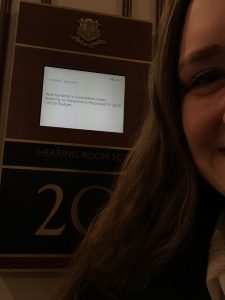The Legislative Appropriations Committee convened at the Legislative Office Building in Hartford on Tuesday, February 21st, 2017 for a public hearing to discuss the Governor’s 2018-2019 budget. The budget called for cuts in funding for the expansion of Charter schools, and increased funding for afterschool programs in the school districts with the highest need. Many individuals and families took advantage of the hearing’s public status to let their voices be heard. The hearing started at four o’clock in the afternoon, but by three thirty there was a line down the street to get into the hearing. Mothers were waiting outside wearing large badges that said “PROUD CHARTER PARENT” on the fronts of their shirts, and whole families, including very small children, were wearing bright orange shirts that had “I heart my Charter School” written on them in big lettering. Most members of the public seemed to be focused on issues of equality.
Inside the hearing room, the majority of those waiting to testify were young students. Daria Coleberg, a sixth grader from Groton, Connecticut, gave an articulate testimony about how Charter schools have benefited her and her two siblings. Coleberg attends the Dual Language and Arts Magnet School, and spoke about the school’s bilingual language programs– Daria is now a proficient Spanish speaker, despite knowing no Spanish before starting at her school. She spoke about opportunities such as trips to Nature’s Classroom that the school can provide with the funding it has now, and urged the committee to continue to fund more Charter schools.
Similarly, Justin Ferrera, a graduate from Trumbull Agriscience School and the Connecticut state President of the Future Farmers of America, testified about his experience at his vocational agricultural school. He credits the school for his success so far in his life, saying that the school “changed me into the leader that I am today”. Ferrera expressed his concern that there would be no increase in funding for schools like his, stating that it is difficult for “ag-programs” to provide the amazing hands-on experiences they can provide students when they typically have only $3,200 per pupil spending.
All the students that spoke believed that their Charter schools helped promote equality. Charter schools were described as a place where all people of all different types of backgrounds could come together and receive an outstanding education. The idea was that to promote Charter schools was to promote equality. Andrea Lineux, a mother of three children that attend or attended Charter schools, spoke about her kids’ transitions into normal public schools after going to charter middle and elementary schools. In the public schools, her kids saw more bullying and racism, and less appreciation for different cultures (her children had attended the Regional Multicultural Charter School and the Dual-Language and Arts Charter school). The beauty of Magnet schools, according to Lineux, is that they value all children of all different cultures, and mix students from different parts of the state into one school. With 6.5% budget cuts, Lineux worried about what would happen to the “gems of public schools”–the Magnet schools. She stated, “The proposed cuts, and especially their magnitude, is causing me to lose faith in our education system”.
There is, however, an argument for equality that does not include increased funding of Magnet schools. Superintendent of the Bridgeport Public Schools, Aresta Johnson, argued in her testimony that the budget should allocate more resources to public school systems in need, such as her own. According to Johnson, the Bridgeport Public Schools are the most underfunded schools in the state. The district has a rate of $14,328 per pupil expenditures, while Hartford, as a comparison, has a rate of just under $20,000 per pupil expenditures. They serve a population of students that is comprised of 15% English-Language Learners and 16% Special Education students. BPS faces reductions in their teaching staff and their counseling staff as a result of their low funding. Johnson argues that in order to promote equality, more budget funds must go to public schools that need help as opposed to more Magnet schools.
It is difficult to say whether or not Charter schools promote or negate equality in the public school system. But, the Committee of Appropriations has decided that the number of Charter schools the state has now is enough, and while they will continue to have state funding, it is time to focus state resources on the neediest school districts.


